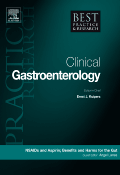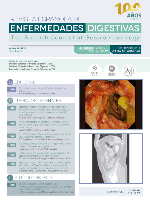
Lancet Gastroenterology & Hepatology
Scope & Guideline
Transforming patient care through innovative research.
Introduction
Aims and Scopes
- Clinical Research and Trials:
The journal publishes original research on clinical trials related to gastrointestinal diseases, liver disorders, and treatment strategies, highlighting advancements in therapeutic approaches. - Public Health and Epidemiology:
It addresses global health issues related to gastroenterology and hepatology, including the epidemiology of liver diseases and the impact of public health policies on disease management. - Technological Innovations in Gastroenterology:
The journal explores the integration of technology in clinical practice, such as artificial intelligence in endoscopy, which enhances diagnostic accuracy and patient outcomes. - Multidisciplinary Approaches:
It emphasizes collaborative approaches in managing complex conditions like inflammatory bowel disease, liver diseases, and colorectal cancers, promoting integrated care models. - Health Equity and Access:
The journal highlights disparities in healthcare access and outcomes, advocating for equitable treatment options for diverse populations affected by gastrointestinal and liver disorders.
Trending and Emerging
- Artificial Intelligence and Machine Learning:
There is a significant uptick in studies exploring the application of AI and machine learning in diagnostics and treatment planning, particularly in endoscopy and personalized medicine. - Microbiome Research:
A growing body of work is focusing on the role of the gut microbiome in gastrointestinal health and disease, with implications for treatment strategies and dietary interventions. - Integrated Care Models:
Emerging themes emphasize integrated care approaches for chronic conditions like inflammatory bowel disease and liver diseases, promoting collaboration across specialties for better patient outcomes. - Health Disparities and Equity:
An increasing number of studies are addressing health disparities and advocating for equity in healthcare access and treatment, particularly in underserved populations. - Innovative Treatment Modalities:
Research is trending towards novel treatment modalities, including biologics and advanced therapeutics for conditions like non-alcoholic fatty liver disease and inflammatory bowel disease, reflecting a shift in therapeutic focus.
Declining or Waning
- Traditional Pharmacotherapy:
There is a noticeable decline in publications focused solely on traditional pharmacotherapy for gastrointestinal disorders, as the field shifts towards precision medicine and personalized therapies. - Invasive Diagnostic Procedures:
Research related to invasive diagnostic procedures has decreased, with a growing preference for non-invasive techniques and advanced imaging technologies. - Single-Disease Focus:
The emphasis on single-disease studies is waning, as there is an increasing trend towards holistic and multidisciplinary approaches to patient care, encompassing comorbidities and overall health. - Static Treatment Protocols:
There is a reduction in studies advocating for static treatment protocols, with a shift towards adaptive treatment strategies that consider individual patient responses and preferences. - Basic Science Research:
While still relevant, basic science research in gastroenterology and hepatology is receiving less emphasis compared to clinical and translational research, reflecting a prioritization of immediate clinical applications.
Similar Journals

Clinical Gastroenterology and Hepatology
Transforming Knowledge into Clinical PracticeClinical Gastroenterology and Hepatology, published by Elsevier Science Inc, stands as a leading journal in the fields of gastroenterology and hepatology. With an ISSN of 1542-3565 and an E-ISSN of 1542-7714, this esteemed publication has earned its place in the top quartile (Q1) of both gastroenterology and hepatology categories as of 2023, ranking 6th out of 167 and 7th out of 82 respectively. The journal aims to disseminate innovative research, clinical studies, and case reports that advance the understanding and treatment of gastrointestinal and liver diseases. Targeted towards researchers, healthcare professionals, and students, it provides crucial insights into emerging therapies and medical advancements. Clinical Gastroenterology and Hepatology is not only a pivotal resource for contemporary gastroenterological research but also fosters collaboration and knowledge-sharing within the medical community. With a converging publication history from 2003 to the present, the journal continues to build on its solid foundation of scientific excellence and relevance.

JOURNAL OF PEDIATRIC GASTROENTEROLOGY AND NUTRITION
Pioneering insights in pediatric gastroenterology and nutrition.Journal of Pediatric Gastroenterology and Nutrition is a premier academic journal published by Wiley, focusing on the critical intersection of pediatric gastroenterology and nutrition. Established in 1982, this journal has been at the forefront of research and clinical practices for over four decades and continues to contribute invaluable insights to the fields of pediatrics and gastrointestinal health, boasting a Q1 ranking in Pediatrics, Perinatology and Child Health and a Q2 ranking in Gastroenterology as of 2023. The journal features a comprehensive array of original research, review articles, and clinical studies aimed at improving the understanding and management of pediatric gastrointestinal disorders and nutrient imbalances. Edited with expertise, the Journal of Pediatric Gastroenterology and Nutrition serves as an essential resource for clinicians, researchers, and students dedicated to advancing the well-being of children with digestive health issues. Readers can access the journal's impactful research studies through traditional subscriptions.

Best Practice & Research Clinical Gastroenterology
Exploring Innovations in Clinical GastroenterologyBest Practice & Research Clinical Gastroenterology is a leading journal in the field of gastroenterology, published by Elsevier Science Ltd, that aims to disseminate high-quality research and evidence-based guidelines for clinical practice. With an impressive impact factor and ranked in the top tier (Q1) of gastroenterology journals as per Scopus, it is recognized for its critical role in advancing knowledge and best practices in clinical settings. The journal is published biannually with content that spans a wide array of topics affecting the gastrointestinal tract, and it encourages contributions from researchers and professionals who seek to enhance their understanding and improve patient care. It's accessible in both subscription and open access formats, allowing for a broad audience engagement and dissemination of pivotal research findings. Since its inception in 1999, Best Practice & Research Clinical Gastroenterology has served as a vital resource for clinicians and academics alike, contributing significantly to improvements in gastroenterological health.

EUROPEAN JOURNAL OF GASTROENTEROLOGY & HEPATOLOGY
Advancing knowledge in digestive health.The EUROPEAN JOURNAL OF GASTROENTEROLOGY & HEPATOLOGY, published by LIPPINCOTT WILLIAMS & WILKINS, serves as a key platform for disseminating cutting-edge research in the fields of gastroenterology and hepatology since its inception in 1989. With its ISSN 0954-691X and E-ISSN 1473-5687, the journal has established a prominent reputation, as reflected in its 2023 rankings, placing it in Q2 for Gastroenterology and Q3 for Hepatology. It is ranked #75 out of 167 in gastroenterology and #39 out of 82 in hepatology according to Scopus, highlighting its importance in advancing knowledge and clinical practices. While it does not currently offer open access options, the journal remains essential for researchers, healthcare professionals, and students seeking to stay abreast of significant developments and innovations in digestive health. By providing rigorous peer-reviewed articles, the EUROPEAN JOURNAL OF GASTROENTEROLOGY & HEPATOLOGY continues to contribute to the understanding and treatment of gastrointestinal and liver diseases, making it a vital resource in the medical community.

Korean Journal of Gastroenterology
Fostering Global Dialogue on Digestive HealthKorean Journal of Gastroenterology (ISSN: 1598-9992, E-ISSN: 2233-6869), published by the Korean Society of Gastroenterology, has been a premier outlet for research and advancements in the field of gastroenterology since its inception in 1968. This open-access journal, based in South Korea, fosters a global dialogue on gastrointestinal health, embracing contributions from a diverse array of disciplines within medicine. It is currently ranked in the Q4 quartile for miscellaneous medicine and holds a Scopus rank of #323 out of 636 in general medicine, reflecting its commitment to publishing impactful research despite its relatively recent establishment in high-impact metrics. With a continuous publication timeline extending through to 2024, the journal aims to enhance understanding of gastrointestinal disorders and promote innovative treatments, making it an essential resource for researchers, clinicians, and students alike who seek to stay abreast of the latest developments and clinical applications in gastroenterology.

REVISTA ESPANOLA DE ENFERMEDADES DIGESTIVAS
Pioneering research for a healthier digestive future.REVISTA ESPANOLA DE ENFERMEDADES DIGESTIVAS, a pivotal Open Access journal published by ARAN EDICIONES, S A, has been at the forefront of advancing the field of gastroenterology since its inception in 1990. With a robust commitment to disseminating high-quality research, the journal provides a platform for researchers, clinicians, and students to share innovative findings and insights concerning digestive diseases. The journal is characterized by its Q3 ranking in both Gastroenterology and Miscellaneous Medicine categories, indicative of its significant contributions to these fields, and is positioned within the 36th percentile of Scopus rankings for medicine related to gastroenterology. Based in Spain, REVISTA ESPANOLA DE ENFERMEDADES DIGESTIVAS has embraced the Open Access model since 2004, ensuring that its articles are readily available to a global audience without financial barriers. The journal not only supports academic discourse but also plays a crucial role in improving clinical practices and health outcomes related to digestive health.

JOURNAL OF GASTROENTEROLOGY
Pioneering breakthroughs in digestive health.JOURNAL OF GASTROENTEROLOGY, published by SPRINGER JAPAN KK, is a premier academic journal that has been at the forefront of gastrointestinal research since its inception in 1994. With an impressive Impact Factor and ranking in the top quartile (Q1) of its category, this journal holds a significant place in the field of gastroenterology, currently ranked 12th out of 167 in Scopus, placing it in the 93rd percentile. The journal serves as an essential platform for disseminating innovative research, clinical studies, and reviews that foster advancements in the understanding and treatment of gastrointestinal diseases. Although it does not offer Open Access options, it provides researchers, clinicians, and students access to crucial insights and breakthroughs pivotal to improving patient care and outcomes in gastroenterology. With a commitment to high-quality peer-reviewed content, JOURNAL OF GASTROENTEROLOGY plays a vital role in shaping the future of gastrointestinal health and research.

Frontline Gastroenterology
Transforming Understanding of Gastrointestinal DiseasesFrontline Gastroenterology is a leading academic journal published by the BMJ Publishing Group that plays a vital role in advancing the field of gastroenterology and hepatology. Established in 2013, this prestigious journal has established itself as a significant resource for researchers, healthcare professionals, and students alike, maintaining a commendable impact factor and consistently achieving a Q2 ranking in both gastroenterology and hepatology categories as of 2023. With its focus on disseminating high-quality, peer-reviewed research, Frontline Gastroenterology covers a wide scope of topics pertinent to the understanding, diagnosis, and treatment of gastrointestinal and liver diseases. Although it does not offer Open Access options, its content is accessible through various institutional and personal subscriptions, ensuring that critical findings reach an international audience. As the journal continues to converge into the future, it remains dedicated to fostering innovation and dialogue in gastroenterological sciences.

Gastrointestinal Disorders
Unlocking Knowledge in Gastrointestinal Disorders for AllGastrointestinal Disorders is a prominent open-access journal published by MDPI, based in Switzerland, that focuses on the latest research and innovations in the fields of gastroenterology, hepatology, and immunology. Since its inception in 2019, the journal has provided a vital platform for researchers and professionals to disseminate their findings, engaging with a global audience keen on advancing knowledge in gastrointestinal health. With a dedicated commitment to high-quality, peer-reviewed articles, Gastrointestinal Disorders has gained recognition in 2023, achieving Q3 status in gastroenterology and notable rankings in several other categories, including a respectable position in the quartiles for hepatology, immunology, and oncology. Despite its recent establishment, the journal has quickly become a valuable resource, facilitating open access to critical insights in the study of gastrointestinal diseases and their management, ensuring that emerging research is readily available to inform clinical practice and educate future professionals.

WORLD JOURNAL OF GASTROENTEROLOGY
Advancing the frontiers of digestive health.WORLD JOURNAL OF GASTROENTEROLOGY, published by BAISHIDENG PUBLISHING GROUP INC, stands at the forefront of gastrointestinal research, providing a critical platform for the dissemination of high-quality studies in the field. With an impressive impact factor reflected in its Q1 rankings in both Gastroenterology and Miscellaneous Medicine, this journal is recognized for its rigorous peer-review process and commitment to advancing knowledge and practices related to digestive health. Covering comprehensive scopes from clinical advancements to innovative therapies, the journal serves an essential role for researchers, clinicians, and students, enabling them to stay updated on the latest developments and findings from 1998 through 2024. The open access model facilitates broader accessibility, ensuring that groundbreaking research reaches a global audience. The journal's ranking within the top 15% of Scopus demonstrates its significant contribution to the academic community, making it a valuable resource for advancing the science of gastroenterology.